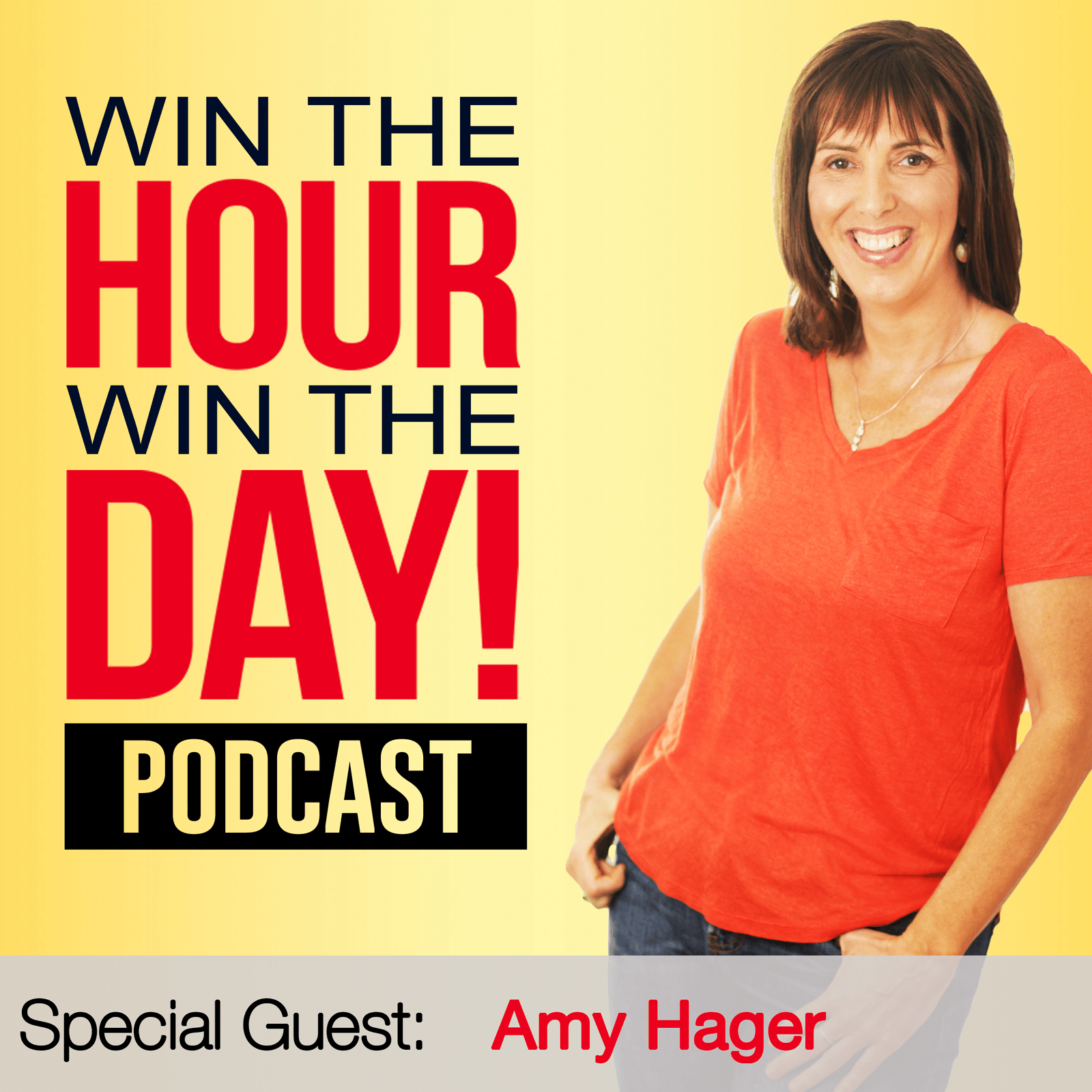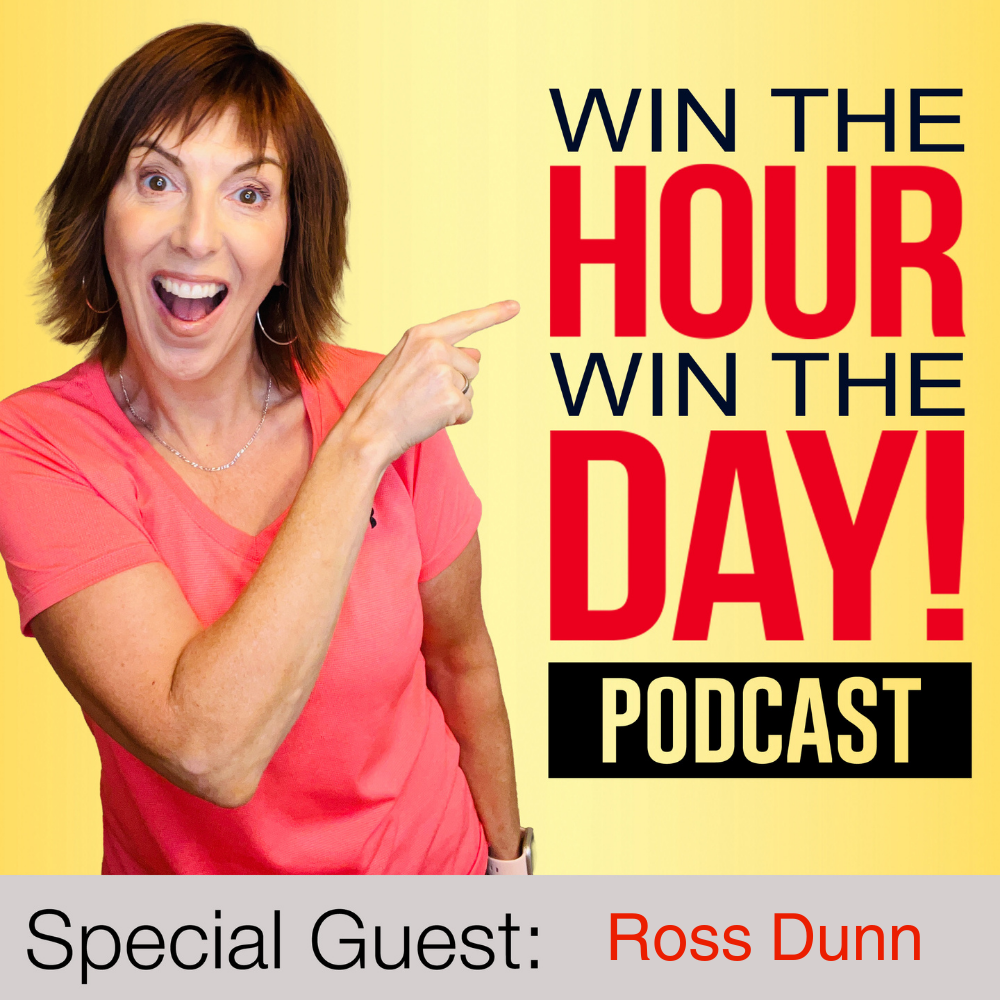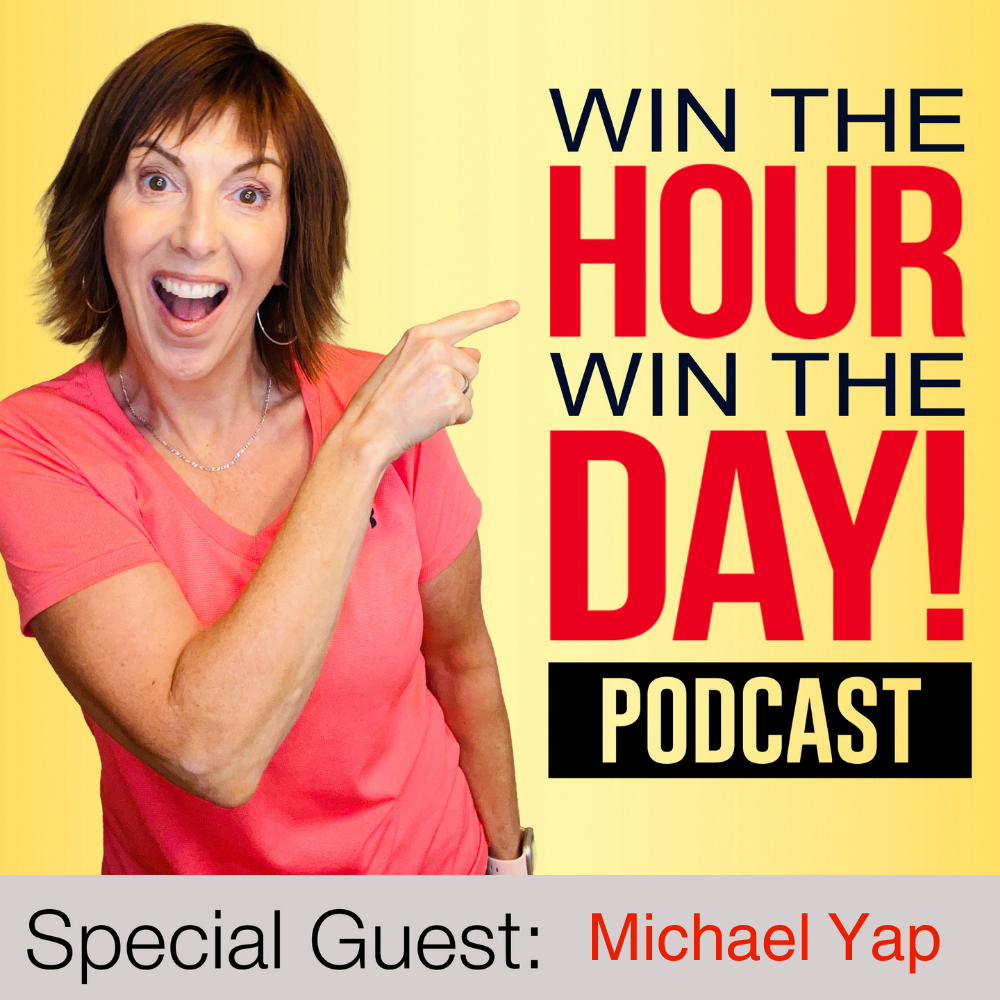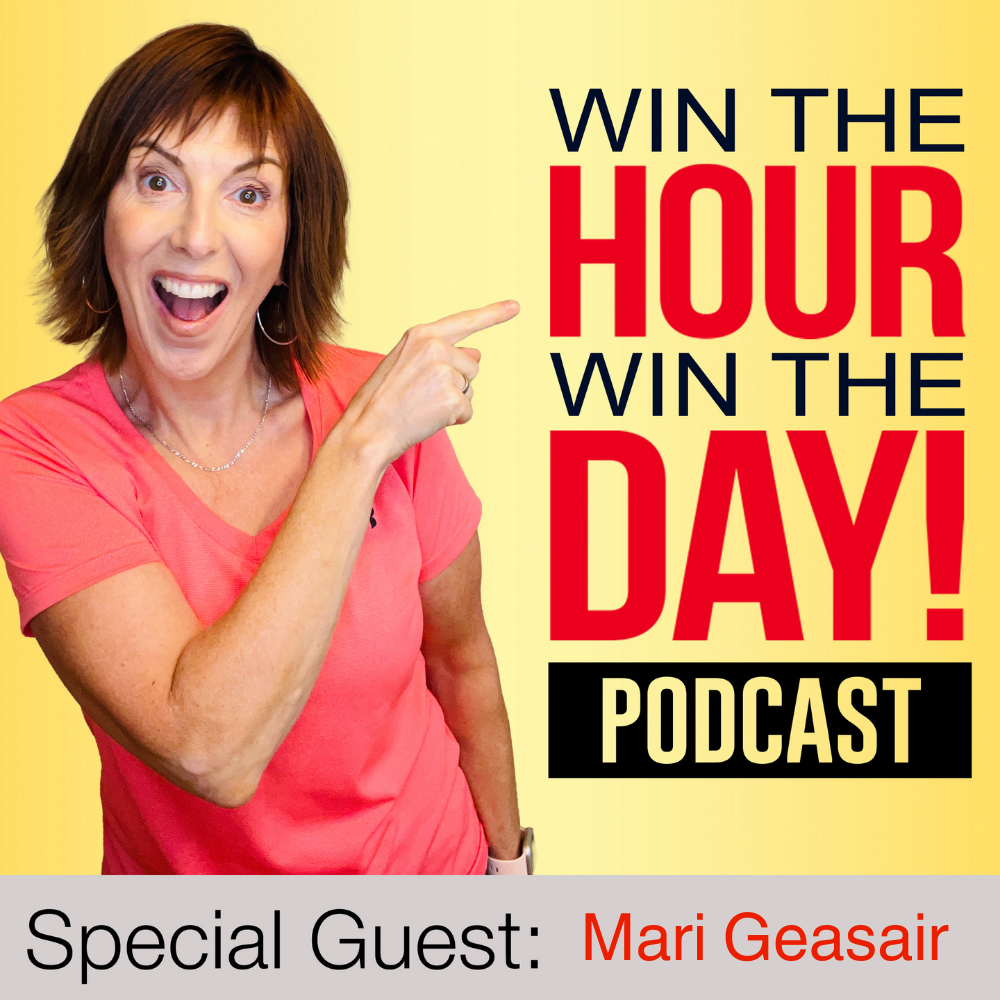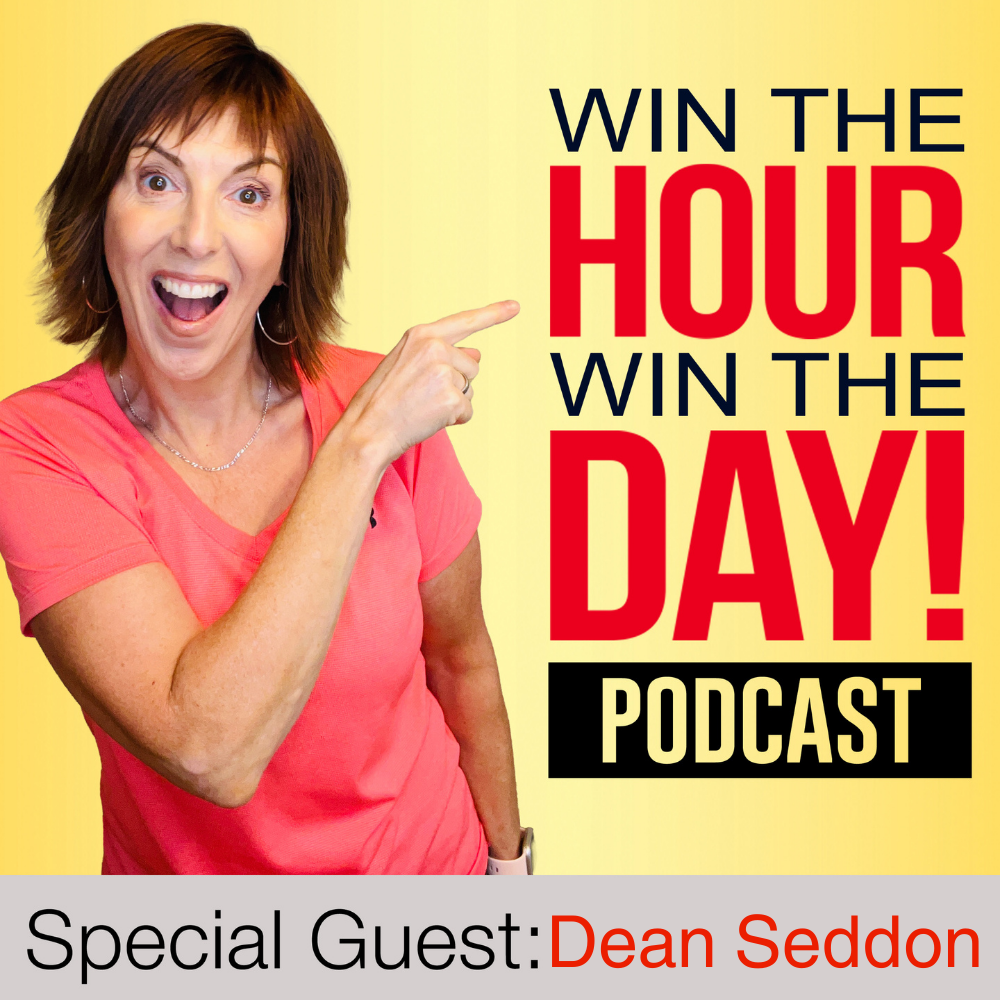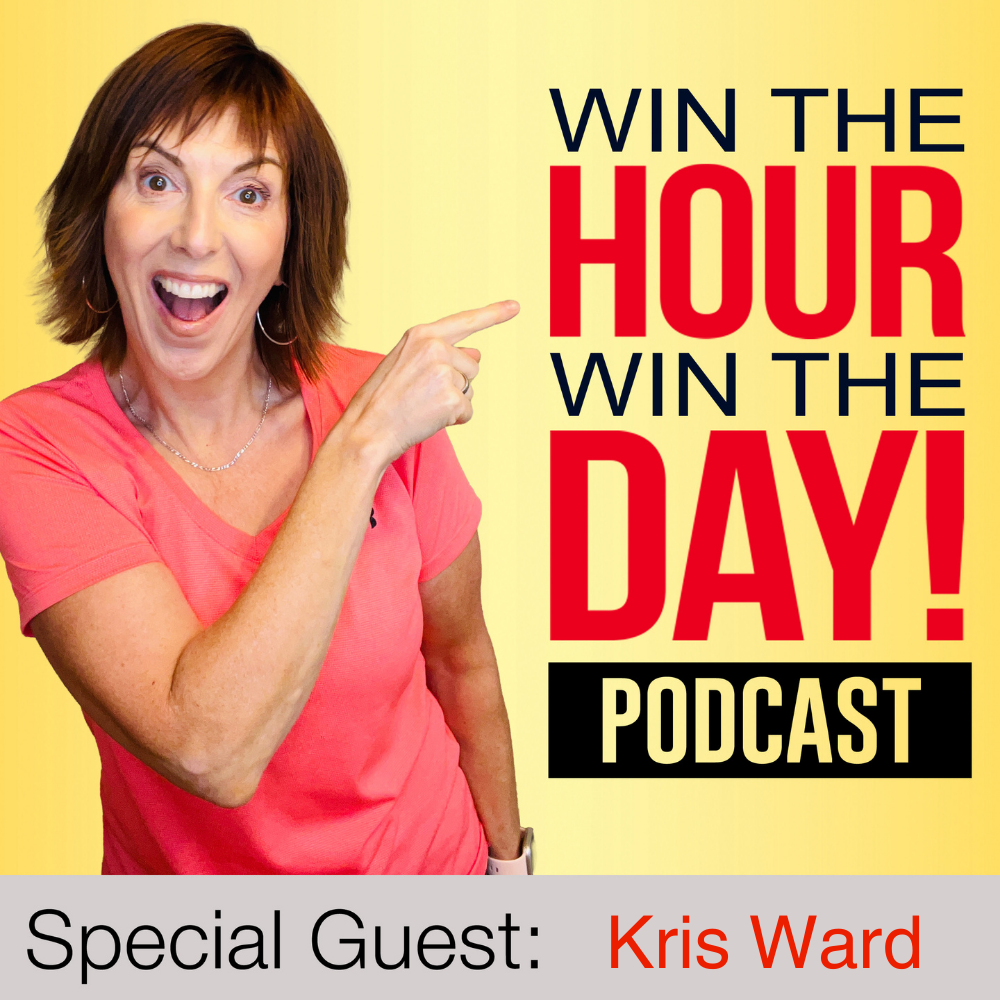Episode Summary
Amy Hager joins us and shines a new perspective on content creation for your small business.
Learn
-what most people are missing from their content and why
-why it’s so important to create conversations
-what is a content ecosystem and why it matters!
And MUCH more!
W.I.N Time Back Quiz
https://bit.ly/WinTheHourWinTheDayScoreCard
Win The Hour, Win The Day! www.winthehourwintheday.com
Podcast: Win The Hour, Win The Day Podcast
Facebook: https://www.facebook.com/winthehourwintheday/
LinkedIn: https://www.linkedin.com/company/win-the-hour-win-the-day-podcast
Win The Hour, Win The Day Winners Circle: https://winthehourwintheday.com/winners-circle-masterclass
You can find Amy Hager at:
Website: https://www.amyhagersolutions.com/
Email: amy@mshannonhernandez.com
LinkedIn: https://www.linkedin.com/in/amy-hager-cae-iom-393493a/
Facebook: https://www.facebook.com/groups/ContentStrategyLab
Win The Hour Win The Day
https://winthehourwintheday.com
Amy Hager Podcast
START[00:12:38]Kris Ward: Hey, everyone. Welcome to another episode of Win The Hour Win The Day. And I am your host, Kris Ward. And today we have Amy Hager in the house. And Amy’s gonna talk to us about messaging ecosystem. Now, that sounds interesting and it sounds almost high tech Amy, but I think from the chats, you and I have had. It’s something really important that we all tend to overlook or at least skim by, am I correct?
[00:13:07]Amy Hager: I think you’re really correct. I think it’s just something that we don’t think about cuz we just get in this content creation flow. And so this was really a great chance to just take a pause and think a little bit more strategically about that messaging that you’re putting together.
[00:13:21]Kris Ward: Well, I think you’re generous when you call it content flow, because I think it’s more for many of us content panic and the beast of content, like, oh my gosh, what am I gonna do next? Right. Oh, so, alright. So you talk about there’s six types that any entrepreneur should really focus on when you’re dealing with messaging in your ecosystem.
[00:13:42] And that could be on any platform that could be your email marketing. That could be whatever. We all now accept the painful truth that we have to be producing. We have to reproducing content. Right. So let’s talk about the six types. Where do we start?
[00:13:58]Amy Hager: Yeah. Well, and so I think before we actually dive into the six types, Kris, Let’s just define messaging.
Before we go too deep into this, because if we’re going into it with the wrong definition, I think it ends up being really confusing. And it’s the term that’s really thrown around quite a bit. So messaging is the words that you are using to really connect the hearts and souls of your future client.
[00:14:21] And Kris, you nailed it. Messaging is basically everything in your business, right? It’s your newsletter, it’s your website copy. It’s your social media post, it’s in your sales calls. It’s in your blogs, your interviews, everything that you’re doing is messaging, right? And so when you’re messaging is strong, we know that everything’s gonna get a lot easier and your marketing, and you’ll see that significant increase in your sales and your revenue, because people are clear on who you are and what you’re doing.
[00:14:50] And so before we dive into the six types, I would love for y’all to ponder this, whether you’re in the car driving, or if you’re sitting at your desk, write this question down, what would shift for you and your business if every time you published a piece of content, you had clients reaching out to you?
[00:15:10] I’m gonna repeat the question. Just so you have it. What would shift in your business if every time you published a piece of content, you had clients reaching out to you? If you’re sitting there, you’re like I publish. And I feel like I’m just talking to the universe of no one or a brick wall. Then I want you to dive in with me on these six pieces of the ecosystem and see if the content that you’re publishing is within one of these six pieces. And if not, let’s bring your focus to there.
[00:15:37]Kris Ward: Let me, hold on. Let me jump in, if I can. I think for me, I think this is important to unpack as well. I think, and it took me a really long time to get over this. And you know, I heard the word perfectionism and that was never, I never own that because I thought I’m not, I don’t think I got it perfect on not trying to get it perfect.
[00:15:56] Right. Like I thought there was some sort of ego to that. But what I did understand whether this falls under the category of perfectionism or whatever, is I fussed with things a lot because I wanted to get it right before I put it out. I wanted to make sure I look prepared and I put work into this and a lot of thought.
[00:16:16] I didn’t subscribe to the fact that the more you put out, I mean, somebody said to me wisely, it’s like getting up to bat. If you swing a thousand times, you’re just gonna become better at bat. So what I wasn’t doing is just putting out content, content, content, trying different things, experimenting, cuz, oh my gosh, there’s an audience.
[00:16:33] Well, and then there’s not because no one’s… don’t get so big on yourself. No one, you don’t have traction on this or you don’t have the audience. Right. So this is a great place to experiment at this point. So I think for me, messaging also felt to me like it was finished. Like back in the day, when you were so excited and you got a website, when dinosaurs roaming the earth.
[00:16:54] And that was really the only way that we were showing we were sort of op our shop was open. And the website was a big deal. And then you worked on this copy and you got off the website and you felt quickly the messaging is done where I have really come to real… I know, I know, right.
[00:17:11] I can’t be the only one that thinks this way, but what I’ve come to realize now is every opportunity I get to speak to someone or every opportunity I put content out. Like somebody was, I was having a chat with somebody who was on my podcast and we had a follow up meeting about something and he was commenting on something that he had saw on LinkedIn of a blog
[00:17:31] I had written and the reply he gave back to me and he said something all of a sudden made me see like a whole different perspective of what I do, because I’m always preaching and bear with me. I mean, because this is really awakening for me and I think it’s gonna lean into what you’re gonna talk about.
[00:17:48] I’m what is, I tend to deal with entrepreneurs that look good on paper, but at this point in their journey, they didn’t expect to be working this many hours. So they’re usually coming to me in crisis. Right. But he had said something about, you know, Kris, you’re always getting entrepreneurs time back, cuz everyone on Winners Circle tells us they get 25 hours back a week.
[00:18:09] And all of a sudden they saw the way he said that on a comment of a post I made that he was, I was realizing. Oh, I don’t need to always speak to everyone in crisis. I don’t need to wait until they get to crisis. All of a sudden I’m like, oh, I could be doing content and messaging about if you just want time back, if you just wanna get to that next project, it could be softer. And before the five alarm bell of the fire goes, I would say..
[00:18:34]Amy Hager: for the house is on fire, right?
[00:18:35]Kris Ward: Yeah. Yeah. And so that really changed all of a sudden that awakened me to a new opportunity that was totally missing in my messaging. So I think what you’re talking, what we’re gonna dive into here is so important because the more messaging stuff, there’s a technical term, write that down. The more messaging stuff you put out there, the more you become aware of what you have to offer and who you have to offer, too.
[00:19:00]Amy Hager: And I think a key point in this story, Kris is conversation is key, right? If your messaging isn’t invoking conversation, if people aren’t asking questions are not reaching out and saying something, whether it’s current client or potential client, right?
[00:19:14] And you can’t get clearer on your messaging in your own head, this is not gonna happen in a silo. Y’all like, it needs to be in collaboration, in conversation. And when you hear those little, ‘Ooh’, write that little tweak, it’s not that you needed to rebuild the house because it burnt down. You just maybe needed to put some new curtains on the window.
[00:19:37] And so having the opportunity to hear and receive that as a business owner, as an entrepreneur, I think is really, really important and how you do that is through conversation. So, Kris, when you made that tweak, do you feel like you have less clients coming to you now that their houses are already on fire? And they’re like thinking a little bit ahead before the house started on fire.
[00:20:00]Kris Ward: I think this is shocking, cuz I’ve been doing it for so long. And this is the point to your message about messaging is you think, listen… every point of this journey, I was so clear that I knew who I was working for.
[00:20:16] Like I wrote my book Win The Hour, Win The Day based on my experience with my clients. So then I was, when I put my book out, I was like, okay, I know who my clients are because I wrote a book based on my experience with them. Then when I put the book out. There was different elements to like, like any book.
[00:20:31] And let’s say there’s three main elements, time toolkits and your team time and super toolkits. I really thought like element number one was the big thing. And it was an element number three was, and I was like, oh, so then my messaging involved again. So you are constantly going, oh, oh, oh.
And so to your message is it’s never done. And the more you put out there, the more you become educated and it just aids you in every way.
[00:21:03]Amy Hager: Well, and I think as you grow as an entrepreneur, as your business grows, as your strengths really shift, as your zone of excellence comes more and more into the play and the work that you’re doing, like your messaging’s a living, breathing thing, just like a human.
[00:21:19] You don’t I think the old way of I built a website and that’s just gonna live. No, you need to be able to have that freedom to tweak and improve. And when something does become clear, cuz it’s gonna happen. It’s never done. It’s never a put on the shelf, put it out there and walk away from it and I think that’s scary sometimes to people too that, oh gosh, this is another thing I need to think about, but just like you shared with us in your example, it was just, oh gosh. In conversation that just came very clear to you that they don’t have to be in crisis to be working.
[00:21:57]Kris Ward: So you talk about the six types. And you talk about, so those are: mission driven, connection, thought leadership, content, brand stance, direct offer, and thought reversal. So let’s go ahead. You’ve made the point to me that if you only rely on one, they, they won’t know you.
[00:22:16]Amy Hager: Right. Exactly. Okay. And so when we’re thinking about the messaging, you really wanna make sure that you are, well, the words that you’re sending you really wanna make sure that those words are both creating a conscious and subconscious signals that they’re causing people to react and create an emotion and really take that action.
[00:22:35] And so either they’re sticking around and buying, or are they running from the Hills? Cause you do wanna repel people, right? You don’t, you’re not for everybody and everybody’s not your client. So when you think about. Let’s start with the mission driven content, really thinking about the growing your community, growing your following, and building that community who loves, who supports you, who shares that mission and vision with you, and maybe even shares that mission and vision like with their friends, like they’re the ones who are kind of talking about you.
[00:23:07] They may not be clients and they may be clients. Well, they should be clients. Really? Your mission driven content should be really speaking to your client’s souls. And so when you have mission driven content. That’s really helping you build your community and it’s landing to where people are talking about your mission, you know, then that messaging is landing.
[00:23:29]Kris Ward: But what if you feel that you don’t have… like you’re new at creating content or you’re just haven’t been giving whatever aspect and as enough attention you feel like I don’t have a community, like I’m putting stuff out there, but I wouldn’t pretend to say there’s a community there supporting.
[00:23:45]Amy Hager: There are people watching you all the time.
[00:23:48]Kris Ward:That is true. I remember somebody reached out to me on LinkedIn and I know this now, cuz I, when I look at other people’s social media stuff, I always chime in because I can control that. I can’t control. Like it it’s a good networking tool, but not everybody is doing it that way.
[00:24:01] But I remember, I always remember this person and she’d reached out to me on LinkedIn and she listed all these things, blah, blah, blah, blah, wanted to meet with me. And I was like man. I haven’t like, I don’t know this name. I haven’t seen her anywhere. I would remember. And she said, you never know, who’s watching, I’ve been following you for a really long time.
[00:24:16] And I was like, you know, I know that I’m a grown up person, so you’re right. You’re right. You’re right. You’re right. Okay. So then that speaks to the fact that you made a really good point is we look at somebody that we admire, or that has a very clear following on some platform.
And that it’s very, the numbers are there and we associate that with a community, but the community has different layers of involvement. So don’t think you don’t have a community.
[00:24:46]Amy Hager: Exactly. That is the key mission driven content. Don’t think that you don’t have a community. You do. There are people who are reading things who are looking at things who may not be liking, loving and commenting.
[00:24:57] Okay. But all of a sudden, when they come out of the woodwork and they know all of this stuff about you, they know it because you were putting content out there. They would not know anything about you. If you didn’t put anything out there.
[00:25:10]Kris Ward: Hundred percent. Okay. You were so right. Okay. Amy, connection.
[00:25:15]Amy Hager: Yeah. So then really just showing who you are, right. Making sure that people know, like, trust that know like, and love trust factor, and that you’re a real person. And remember people will do business with you with you when they feel like they know and they feel like they trust you.
[00:25:35] And so that connection content. Can maybe shine a little bit of light on what’s going on in your business. Shine a little bit of light on what’s going on in your personal life. You know, a lot of people are like, oh, social media is just all farce because it’s just beautiful vacation photos and my kids are behaving so well and yada, well, yeah, I get that.
[00:25:54] That is what some people are doing, but when you’re mixing your connection content and with the other ecosystem content, that’s key. If it’s all just business, business, business. And you’re not allowing people to really connect with you on that personal level. It’s really, really hard to build that. No, like love and trust factor, right?
[00:26:13]Kris Ward: Yeah, it is. And that’s when I dropped the ball on a thousand times, and people like my team calls me out on it and people I’ve met have mentioned that to me. And it’s because I just think, and I’ve got a different, a fresh lens on social media now. And I really have to be honest and say, TikTok helped me with that because I would look at stuff and say, I I’ve always led a very quiet life.
[00:26:35] I would much sooner get up early and have a day of it and go to bed early. So I always said, well, I’m not doing anything interesting. Right. So it wasn’t that I was protective or private. It was just like, I didn’t think this was worth whatever, but. Right. You know, me being me is just me being me. So if my life is quiet and boring, then show what my quiet life and boring life looks like.
[00:26:58]Amy Hager: Exactly that. Yeah. And I wonder too, like when you think about your ideal clients, Kris, like sometimes the extrovert energy or the introvert energy that you show on social media. And I know that a lot, we work with a lot of introverts and they say the same thing that you just said to me, it, my life is boring.
[00:27:17] I don’t really do anything. I’m not an amazing cook. I’m not taking vacations. I just hang out here. And I like to read my book. What book are you reading this month? Right. Or this week or this day. Right?
[00:27:29]Kris Ward: And you’re right, because a lot of my clients say the same thing to me. Like I’ll give, like they were alike. So if I say, look, you know, I’m passionate about bike riding in the summer, or here’s a book, or I do like, you know, how I get stuff done by my neighbors. They like my cookies. Sorry. here we go. So, yeah, but that’s what my clients are like, so you’re right. Why am I trying to be, I don’t know, an interesting sort of entertainer if that’s not my audience anyhow.
[00:27:57] Right. Very good point. Right. So the boring people that I would connect with will connect with my boring life. Okay. Awesome. Okay. Good perspective. And I don’t think I’m boring. I just think it’s like, I like it. I’ve always had a quiet life. I like it. It’s not boring to me, but I just thought, well, I don’t have anything to tell you about, but okay. Excellent. All right. Thought leadership content.
[00:28:19]Amy Hager: And so when you’re thinking about that, this is where you get to stand in that expertise, right? It’s that educational in nature and it’s sharing solu… well, let me back up a lot of times with our thought leadership content, we overshare in solutions.
[00:28:38] So instead of providing solutions, what I want you to think of when you’re creating thought leader content is how is this educational? Okay. Okay. Because you don’t wanna lose a sale by someone reading, watching, your thought leadership content. So you don’t wanna give away what you’re doing or what your solution is for free, but you do wanna make sure that you’re creating an educational nature.
[00:29:06]Kris Ward: Okay. So could you give us an example for that?
[00:29:09]Amy Hager:So this session right here, I’m completely breaking all the rules when it comes to thought leadership content, right? That’s the format of your podcast today, but really if you are giving tips and then telling people how to execute on those tips, that execution part is the overselling part that we really have to pull back.
[00:29:28] Think about can you talk through a mistake maybe that people are making, instead of giving them a solution for them to relate to, can you talk through something that you’re observing as far as trends or something that you are seeing with the potential client? They’re able to solve once they come and work with you, but creating that awareness of what is actually going on and what the actual problem might be instead of completely just giving solutions, giving tips all the time.
[00:30:01]Kris Ward: Okay. So back. So I did use to stumble off this more. So one of the things that breaks my heart is when I see people chasing the wrong thing or putting a lot of work into the wrong thing. Right. And so in my case, lots of times I hear people say like, oh, if I was just more disciplined or more organized, you know, and whatever, once I get past this next thing, And it’s like, no, you have no infrastructure in the business.
[00:30:25] And this isn’t about you not working hard enough or white knuckling it and being more disciplined that actually erodes your.. Or fatigues you more and all this other stuff. Right. So, in the past. When the book first came out, I might give you different hacks or things to do, like just to save you an hour a day.
[00:30:44] And they were howtos, but I wasn’t addressing the bigger pain point cuz then I’m just buying, you know, kind weight watchers. Here’s some hacks. But it’s really not about, Hey, you’re eating when you’re upset, so you’re never, these hacks are never going to solve your bigger issue. So a lot of us get caught up in the little howtos and we’re really not making the mind shift of educating our audience with you’re over here and you should be over here.
[00:31:11] And let me tell you why you’re lost and not get into the increments of exactly what every little micro step you need. And I think we get confused with that, Amy, because then you get concerned or confused. And when you see somebody on LinkedIn and they’re like, here’s five ways to improve your profile.
[00:31:29] And I’m like, oh, I don’t have these quick howtos and they’re delivering content. But now that I realize this, I think there’s just different different approaches, but then I would be like, okay, I better give some howtos, but the howtos just stress my people out because it’s not solving their problem.
[00:31:45]Amy Hager: Exactly. And I think that’s the thing that we’ve really found too with our people is when you do create those little micro baby tiny, like hacks winds, whatever. It’s like that false hope and it’s not really solving that root problem that they probably have. And guess what solving that root problem is only gonna have when they dig deeper and working with you.
[00:32:05]Kris Ward: Right. Okay’s it would be like, I always compare it to weight loss, cuz everybody’s always wanted to lose right. Five pounds at one point. So it would be like, okay, chew your food slower. Okay. That is helpful, that does help digestion does help a number of things, but if that’s not going to help you lose 10 pounds. So, so it is helpful, but that’s not your bigger pain. Right? Okay. Exactly. All right. Thought leadership content, brand stance.
[00:32:34]Amy Hager: All right. So with your brand stance, you really want to. I guess this is really taking the chance to share your stance, share your thoughts, share your commentary on what’s going on in your industry.
[00:32:47] What do you agree with? What don’t you agree with? What do you disagree with? I guess? What can add to the discussion? And so. Really your brand is gonna be different than the brand next to you. Right? Like when we compare Nike and Adidas, we like Nike, for one reason, we like Adidas for others and they both have brand loyalty. Right. But it’s because they’ve really taken that stance in what they’re for. And maybe what they’re not for.
[00:33:14]Kris Ward: Okay. So one of the things I say, which a lot of people that do somewhat similar to me do not like this is my thing. I don’t believe in delegating. Delegating is a lateral move. The work has to come through you.
[00:33:27] So everybody else that’s a buzzword for everybody else. Oh, you delegate blah, blah, blah. And I’m like, yeah, here’s, here’s what you need to know. Yeah. Delegating is not serving you and I don’t believe in it. Right. So it’s like a lateral Moo. So that would be a brand stance.
[00:33:40]Amy Hager: That is a brand stance. Yeah. Okay. So a great example for like our brand is we don’t believe that you need to be on all the social media channels and that you should be on multiple channels, creating multiple types of content. We believe you have one content personality type. And when you create that content from there, and show up on one channel plus your email. That’s all you need to do to market your business.
[00:34:05]Kris Ward: Okay. All right. Well, that’s good news for everyone. Write that down. Okay.
[00:34:10]Amy Hager:Those are just examples as brand stance, right?
[00:34:12]Kris Ward:Okay. Now, direct offer is that obvious? I
[00:34:16]Amy Hager: That is the most obvious content out there. Right? That’s when you make that direct offer to your audience and it gets its name for being very direct.
[00:34:25] The purpose is to sell your offer directly to whoever is ready now. Okay. And you know, I’ve coached hundreds of people on selling. The one thing they miss is they don’t ask for the sale. So this direct offer content and it’s full, true force. A lot of times actually doesn’t get used in it’s full, true force because people don’t ask for the sale.
[00:34:49]Kris Ward: Okay. So it’s not as obvious as we think. All right. This one, I’m interested in it. Okay. This one, here we go, because it’s so I don’t know where we’re going with thought reversal.
[00:34:59]Amy Hager:Yep. So the thought reversal content. We kind of touched on it maybe a little bit before, but this is where you help your future clients see where they might need to shift their established thoughts so they can actually get the results that they desire. Right. And so it’s changing the thought that they have of how a thing should be.
[00:35:27]Kris Ward: So for me, it would be, you have been led to believe that grinding it out sweat equity is the deal. And I would say those are just people making a glorified story out of an ill plan journey. So the thought reversal of listen, grinding it out is working against you a thousand percent.
[00:35:45]Amy Hager: Right.
[00:35:46]Kris Ward: Okay.
[00:35:47]Amy Hager: So when you’re hearing a lot of people come to you and say something like, oh, well I was taught to hustle. I was taught to hustle. I’m not hustling. I’m not working 40 hours a week. Giving that thought reversal content of how to change that perception of that problem is really where then you can establish that shift that they need to make in order to get the results that they desire. So your example is perfect.
[00:36:13]Kris Ward: Well, aren’t you cute? The people I’m working with are not complaining that they’re working 40 hours, but anyhow, yeah, they’re trying to get there because you it’s like potato chips, you just have, you know, one project leads to the next you’re like, oh, this is a thing. Oh, once I get past this next thing.
All right. How long you’ve been saying that. Okay. Great. All right. That’s fantastic, Amy. Okay. Where can people find more of your excellence?
[00:36:36]Amy Hager: Yeah. So if you look for us the Joyful Business Revolution, we’ve got a Facebook group. You can Google us. You can also learn more about our content personality quiz. Again, simply Googling that or find me on Facebook. That’s where I hang out most Amy, A M Y Hager, H A G E R. And I would love to connect with anybody who’s questioning what the messaging ecosystem about, and if they’re actually using it.
[00:37:01]Kris Ward: Awesome. We appreciate you, Amy. Thank you so much. And everyone else, we will see you in the next episode. END[00:37:07]

